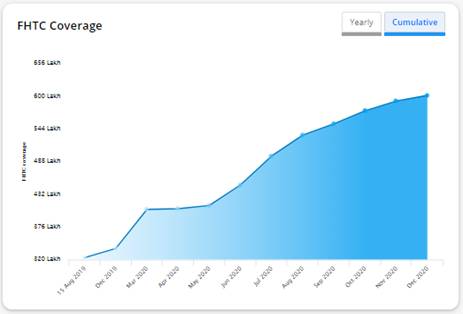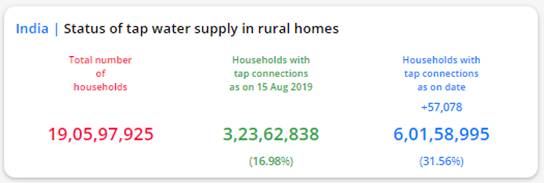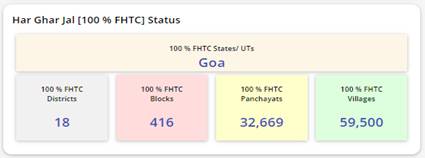Ministry of Jal Shakti
278 Lakh Households Provided Tap Water Connections Under Jal Jeevan Mission
Tap Water Connections Reach Over 6 Crore Rural Households
Over 31 Per Cent Rural Homes Covered
Posted On:
16 DEC 2020 3:43PM by PIB Delhi
278 lakh Households (HHs) have been provided tap water connectionsunder Jal Jeevan Missionwhich was announced on 15 August, 2019.At present 6.01 Crore rural households in the country are getting potable water in their households through taps. 18 districts across the country have provided tap connections to all households and States are competing with each other to ensure tap water supply to every home. A dashboardindicating the progress of the Missionis available at Ministry’s website. (https://ejalshakti.gov.in/jjmreport/JJMIndia.aspx)


The Ministry of Jal Shakti has been implementing Jal Jeevan Mission (JJM), in partnership with States with an aim to provide potable water in adequate quantity of prescribed quality on regular and long-term basis through tap connections to every rural home in the country by 2024.
After the mission came into being, States were requested to undertake a revalidation exercise of baseline data, according towhich there are 19.05 Crore rural households in the country, out of which 3.23 Crore households were already provided tap connections. Remaining 15.81 Crore households are to be provided with tap connections. Thus, the objective is to cover approx. 16 Crore households in a time-bound manner while ensuring the functionality of already provided connections. This means 3.2 Crore households to be covered every year i.e. approx. 88,000 tap connections to be provided on daily basis. With this goal in mind, States/ UTs are making all out efforts to provide tap water connections in rural areas.

In 2020-21, a sum of Rs. 23,500 Crore has been allocated for the implementation of JJM. Besides this, in 2020-21, 50% of 15th Finance Commission Grants to Rural Local Bodies, i.e. Rs. 30,375 Crore as tied grant will be utilized for water supply and sanitation.This will help in better planning, implementation, management, operation and maintenance of drinking water supply systems in villages so as people continue to get potable water on regular and long-term basis.
The mission is exploring partnerships with reputed national and international agencies including UN agencies, NGOs/ CBOs, CSR organizations, trusts, foundations, etc. The Government hopes that water will turn into people’s movement and will become everyone’s business, a transformational change for the sector which has hitherto been seen as only a public sector responsibility.
Various States/ UTs have committed to achieve the goal of the Mission well before 2024. Goa has already ensured tap water supply to all households. In 2021, Bihar, Pudduchery and Telangana have planned to provide tap water connection to all households. Similarly, States/ UTs of Gujarat, Haryana, Himachal Pradesh, Jammu & Kashmir, Ladakh, Meghalaya, Punjab, Sikkimhave planned for 2022.WhileArunachal Pradesh, Karnataka, Kerala, Madhya Pradesh, Manipur, Mizoram, Nagaland, Tripura, Chhattisgarh have planned for 100% coverage in 2023. States like Assam, Andhra Pradesh, Jharkhand, Maharashtra, Odisha, Rajasthan, Tamil Nadu, Uttar Pradesh, Uttarakhand, West Bengal have planned for 2024.
The objective of the Mission is universal coverage and emphasis is on the principle of ‘equity and inclusiveness’ i.e. every family in the village gets tap water connection in their household and ‘none is left behind’. Accordingly, States are giving priority to SC/ ST majority populated villages, aspirational districts, villages in drought prone and desert areas and quality-affected habitations.
Potable water supply to water quality-affected habitations is a top priority under JJM. States have to ensure piped water supply to all households in Arsenic and Fluoride affected habitations before December, 2020.
Being a decentralized programme, Village Water & Sanitation Committees (VWSCs)/ Paani Samiti as sub-committee of Gram Panchayat, with minimum 50% women members, are being formed at village level which is responsible for preparing the 5-year Village Action Plan (VAP) considering the water-sources development, supply, grey-water management and operation and maintenance. JJM also aims at the capacity building of members of Gram Panchayat and/ or its sub-committeeto develop responsive’ and ‘responsible’ leadership at village level, who can manage, plan, operate and maintain in-village water supply infrastructure.
Under JJM, emphasis is given on convergence planning at the lowest level i.e. village/ Gram Panchayat, for source strengthening, water harvesting, aquifer recharge, water treatment and grey-water management, etc., by dovetailing of resources from MGNREGS, 15th Finance Commission Grants for PRIs, SBM (G), District Mineral Development Fund, CSR funds, Local Area Development funds, etc.
‘Skilling’ of villagers on masonry, plumbing, electrical-aspects, motor-repairing, etc. are also given impetus under the mission to have trained human resources at village level.
Monitoring quality of water supplied through drinking water testing laboratories is an important aspect and lot of emphasis is given on strengthening these labs and getting them accredited by NABL. States to open water quality laboratory facilities to general public, so that village lady can come and test the quality of water supplied to her household.
Communities are being enabled to take up surveillance for quality of water-supplied, for which in villages by training five villagers, preferably women, is encouraged so that water supplied in villages could be tested locally. The idea is to make it a reliable and trustworthy arrangement of potable supply.
In line with the appeal of the Prime Minister to ensure ‘ease of living’ in rural areas by providing facilities like financial inclusion, houses, road, clean fuel, electricity, toilets, Jal Jeevan Mission is providing drinking water in every rural household, which will go a long way in improving the lives of rural population. The Mission will also reduce the drudgery of women and girls on whom the primary responsibility of fetching water vests.
****
BY/MG/AS
(Release ID: 1681054)
Visitor Counter : 1077